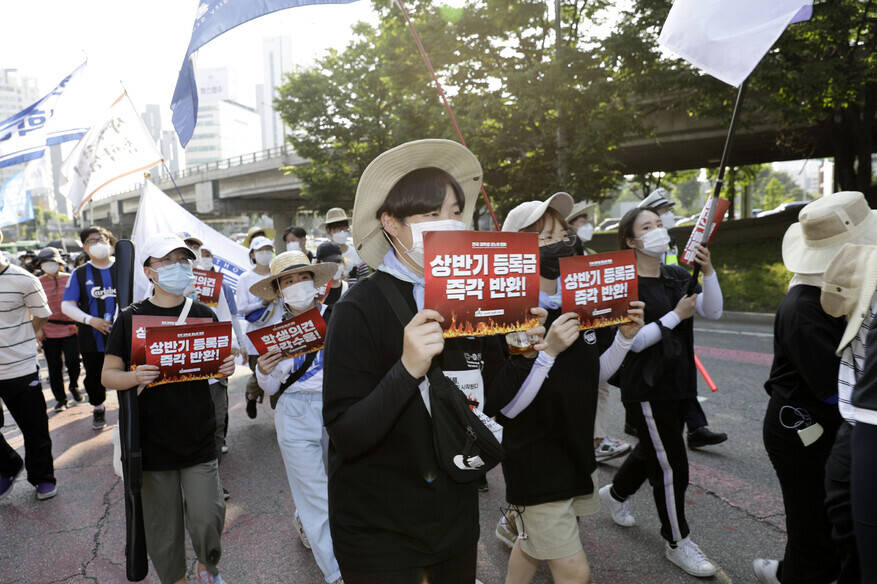hankyoreh
Links to other country sites 다른 나라 사이트 링크
Students move to take legal action against universities refusing to refund tuition

Students demanding tuition refunds, citing a drop in the quality of education due to the shift to online classes amid the COVID-19 pandemic, are taking legal action against universities that have not moved to refund tuition. The students and universities remain sharply divided over the issue of reserve funds as a resource for refunding tuition.
On June 28, the National University Student Council Network announced that “a total of 3,951 people applied in the recruitment of litigants for the return of tuition.” After working through June 30 to finalize individual applicants’ decisions on whether to proceed with legal action, the network announced its intentions to hold a press conference in front of Seoul Central District Prosecutors’ Office and submit a complaint on July 1. In its suit against individual universities and the Ministry of Education (MOE), the network plans to request the return of a portion of tuition as “improper gains” and liability for “damages as a result of nonperformance of duties.”
The students’ decision to embark on their legal action was based on the determination that universities have been avoiding tuition refunds despite having ample financial resources to do so. One basis for this conclusion lies in the reserve funds that universities have set aside for use toward construction, scholarships, and research.
More than 20 universities have reserve funds of over US$80 million
According to a Korea Higher Education Research Institute (KHEI) examination of private university educational expenditure accounting balance sheets for the 2019 accounting year, 20 out of 153 private universities possessed cumulative reverse funds in excess of 100 billion won (US$83.4 million) as of late February 2020. Hongik University had the most with 757 billion won (US$631.4 million), followed by Yonsei University (637.1 billion won, or US$531.4 million), Ewha Womans University (636.8 billion won, or US$531.2 million), and the University of Suwon (361.2 billion won, or US$301.3 million). Those institutions were among 87 universities with over 10 billion won (US$8.3 million) in reserve funds, with the total of all reserves amounting to 7.722 trillion won (US$6.4 billion). Konkuk University, which was to respond to tuition refund demands, has cumulative reserve funds of 84.7 billion won (US$70.7 million); Hansung University, which followed its lead with a decision to return a portion of tuition in the form of “special scholarship funds,” has a total of 18.8 billion won (US$15.7 million).
But other universities have balked, stating that their reserves cannot be used for tuition refunds because they are meant to ensure the sustainability of private universities amid a sustained long-term freeze in tuition rates.
“To refund tuition, universities first have to undertake maximum self-rescue efforts,” said Kim Hyo-eun, a research fellow with KHEI.
“Tuition funds can be saved in particular for construction reserves for the expansion and rebuilding of old classrooms, but for this year at least, we can’t stockpile tuition reserves like that,” Kim said.
By Lee Yu-jin, staff reporter
Please direct comments or questions to [english@hani.co.kr]

Editorial・opinion
![[Column] Season 2 of special prosecutor probe may be coming to Korea soon [Column] Season 2 of special prosecutor probe may be coming to Korea soon](https://flexible.img.hani.co.kr/flexible/normal/500/300/imgdb/original/2024/0426/3317141030699447.jpg) [Column] Season 2 of special prosecutor probe may be coming to Korea soon
[Column] Season 2 of special prosecutor probe may be coming to Korea soon![[Column] Park Geun-hye déjà vu in Yoon Suk-yeol [Column] Park Geun-hye déjà vu in Yoon Suk-yeol](https://flexible.img.hani.co.kr/flexible/normal/500/300/imgdb/original/2024/0424/651713945113788.jpg) [Column] Park Geun-hye déjà vu in Yoon Suk-yeol
[Column] Park Geun-hye déjà vu in Yoon Suk-yeol- [Editorial] New weight of N. Korea’s nuclear threats makes dialogue all the more urgent
- [Guest essay] The real reason Korea’s new right wants to dub Rhee a founding father
- [Column] ‘Choson’: Is it time we start referring to N. Korea in its own terms?
- [Editorial] Japan’s rewriting of history with Korea has gone too far
- [Column] The president’s questionable capacity for dialogue
- [Column] Are chaebol firms just pizza pies for families to divvy up as they please?
- [Column] Has Korea, too, crossed the Rubicon on China?
- [Correspondent’s column] In Japan’s alliance with US, echoes of its past alliances with UK
Most viewed articles
- 1No good, very bad game for Korea puts it out of Olympics for first time since 1988
- 2Division commander ordered troops to enter raging flood waters before Marine died, survivor says
- 3Korea’s 1.3% growth in Q1 signals ‘textbook’ return to growth, says government
- 4Will NewJeans end up collateral damage in internal feud at K-pop juggernaut Hybe?
- 5[Column] Season 2 of special prosecutor probe may be coming to Korea soon
- 6[Editorial] Korea’s surprise Q1 growth requires objective assessment, not blind fanfare
- 7[Column] ‘Choson’: Is it time we start referring to N. Korea in its own terms?
- 8‘We must say no’: Seoul defense chief on Korean, USFK involvement in hypothetical Taiwan crisis
- 9Korea sees more deaths than births for 52nd consecutive month in February
- 10Is N. Korea threatening to test nukes in response to possible new US-led sanctions body?